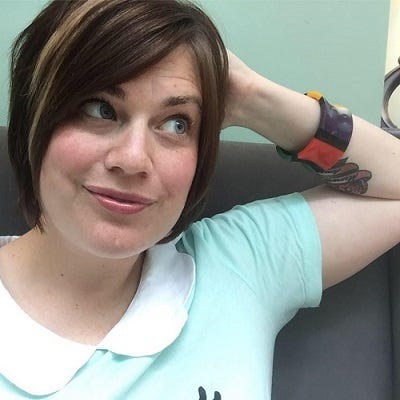Photo by Lexie Barnhorn on Unsplash
“I realized after experiencing my feelings in their entirety that I could move on. And while I couldn’t change my diagnosis with sheer will or prayers, I could change the quality of my life by choosing my perspective.”
In July 2016, I took my lunch break at my favorite coffee shop in downtown Detroit. Shortly after I arrived, without warning, I felt nauseous — like I might be sick. Instinctively, I laid my head on the shop’s marble counter top. Next thing I knew, I was on the floor with somebody’s t-shirts under my head and the EMS crew asking me questions.
I was startled and scared.
I assumed maybe I had worked out too much or had too much caffeine on an empty stomach. I remember wanting to get up and go back to work, but the EMS were not keen on letting that happen. “No, this could be something serious ,” they told me. “We really think you should go to the hospital and get checked out.” When I stood up, I realized just how horrific I felt from hitting my head on the ground. Then it was off to the ER.
My boyfriend joined me at the ER. We told my parents to go home. After all, this was probably not a big deal — or so we thought. A somber-looking doctor shared with me the surprising news… I had a brain tumor. And they needed an MRI to determine whether or not I would be rushed in for emergency surgery. My whole life, my perspective on basically everything, kind of changed at that moment.

I remember very little specifically after hitting my head that day, but I do remember the MRI. I recall trying quickly to make peace with a potentially very dark diagnosis. I thought of how much I loved my family and friends and how most of the stuff I had been upset or worried about until that very moment was downright stupid and petty. It was a pretty ponderous and deep hour spent getting the MRI.
Fortunately, I did not require emergency surgery. This gave me some time to find a surgeon who specializes in deep left temporal lobe operations. My craniotomy took place in early October 2016 at Henry Ford Hospital in Detroit. My surgeon was Dr. Air, and she did an amazing job. She safely removed what she could of my tumor without causing permanent damage to my speech or long-term memory. (Or close enough. My memory skills bit the dust, but I think they were on their way out the door anyway.)
But the scariest part wasn’t the tumor or the surgery — the scariest and most surprising part happened about 10 days later when my neuro-oncologist (who I now share links and videos with regularly) gave me The Call. I knew I’d get a diagnosis with The Call, only I was expecting a low grade brain tumor — an inconvenient butt-nugget living upstairs.
Imagine my surprise and terror when I was told that, in fact, I had a grade 3 anaplastic astrocytoma. Basically, a baby glioblastoma. Most people have some familiarity with a glioblastoma (i.e. Beau Biden and John McCain), but they don’t know that a glioblastoma is a grade 4 astrocytoma. If your brain tumor is graded a 3 or 4 you essentially have a cancer that has no cure and is likely to return (at some point). There’s a genetic something or other here or there, and they give hints as to which treatment and what kind of encore performance you have to look forward to, but, by and large, it’s a scary diagnosis for a cancer newb.
I remember when my neuro-oncologist, Dr. Snyder, told me my diagnosis — I asked him if I could call him back. He told me of course and that he and nurse Francine would be available to see me at the West Bloomfield office right away that day. After agreeing to come by I hung up the phone, stood on my front porch, and screamed. I wasn’t heroic, stoic, or brave.
I screamed.
That was a pivotal moment.
I couldn’t control my thoughts and moods all the time, but I realized after experiencing my feelings in their entirety that I could move on. And while I couldn’t change my diagnosis with sheer will or prayers, I could change the quality of my life by choosing my perspective.
I let myself cry, mourn, and feel jealousy and fear — because those feelings are real and inescapable. But those feelings aren’t the boss of me, now.
Over the last two years, I’ve learned a lot about brain cancers, I’ve made a lot of friends, and I am a socially-active cancer patient. For me, I find helping other people through patient organizations and groups (Imerman Angels, Henry Ford’s Hermelin Brain Tumor Support Group, Twitter’s monthly #btsm group, American Brain Tumor Association events, etc.) hugely empowering and comforting.
I also find power in speaking and writing my story. In complete honesty.
A few months into my cancer treatment, my mom was diagnosed with pancreatic cancer. She passed away almost a year after her diagnosis. When she was diagnosed, I felt like I had to stop being the fragile baby of the family and learn to advocate for patients who do not have the ability or desire to speak. I wanted to be a voice my mom would be proud of. And she was proud.

There’s a sort of confidence and impulse to truly LIVE when you’re confronted with that fact that your life timeline might be a lot shorter than most folks you know. But it can be a very liberating, too. After all, life itself is terminal. It’s this crazy little fire-filled adventure and, in the grand scheme of things, short for us all. My brain has turned into a pithy motivational card, maybe. But the one thing I have learned since an unwelcome roommate has taken residence in my brain — live your best life, and live it right now.
After spending 36 years aimlessly searching for meaning, Molly, in 2016, found it with a brain cancer diagnosis. Molly is a cancer patient advocate, speaker, and writer. ‘Diagnosis isn’t the end, it’s the start.’
You can follow along with Molly’s journey at @lifeiskitsch.
